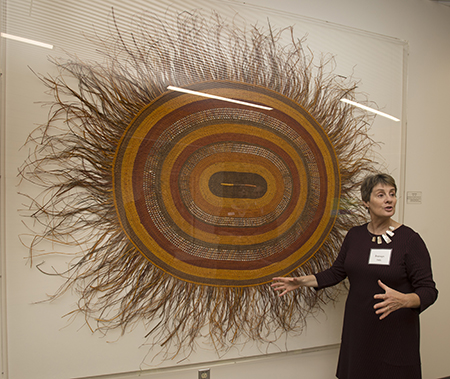Bronwyn and David Fields art donation
Art donation celebrates personal transformation

Bronwyn Fields discusses the history behind Aboriginal weaving she donated to the School of Nursing’s art collection.
In more than three decades as a nurse, Bronwyn Fields served in many capacities. From providing public health services to working with governments in South East Asia and with Aboriginal communities in her native Australia, Fields’ professional calling shapes her personal life.
“My life is full of experiences with people, places, traditions and practices that are very different from my own,” said Fields, a 2016 doctoral alumna from the Betty Irene Moore School of Nursing at UC Davis. “Those experiences shaped who I am today.”
When Fields met her husband, David, he, too, was living among different cultures. Working as a foreign service officer for the U.S. Department of State, he spent time in Africa, where he began collecting art. It is a passion shared by his future wife, as Fields procured pieces indigenous to the regions in which she was working.
“One evening in Ramingining, a small community in Australia’s Northern Territory, an artist came to my door to sell a woven textile,” Fields recalled. “She laid it out on the porch and taught me about the pandanus grass that grows in the area, the natural dyes and the Aboriginal techniques she used that had been passed down to her from generations past.”
The artist was Elizabeth Djuttara. And that weaving, which once was part of a rotating display in a museum in Australia, now hangs inside Betty Irene Moore Hall. It is one of four pieces the Fields donated to the School of Nursing and among more than 40 pieces in the school’s collection.
“I feel like it deserved to be constantly on display, plus I wanted to give back to the School of Nursing that gave so much to me,” Fields said. “I really miss that close relationship I had with the faculty, staff and students, and I wanted to maintain that connection.”
Other donated pieces include a wooden Dogon door which David purchased in Burkina Faso, as well as a fang mask from Gabon and an Igbo mask from Nigeria. Each contribution represents places that influenced their past lives and now live in an environment that shaped Fields’ future as a health care educator and researcher. The Fields hope these works create a sense of curiosity about other people and other cultures, highlighting the differences by celebrating connectedness.
“With part of my art collection now inspiring visitors to Betty Irene Moore Hall, I know a piece of me will always be there and that makes me happy,” Fields said.





